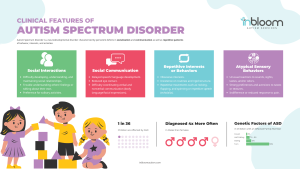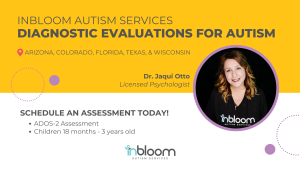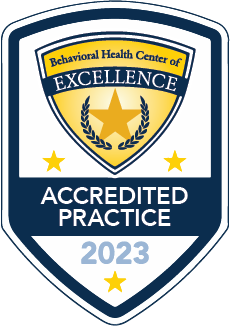Understanding Autism: From Early Signs to Diagnosis

What is Autism?
Autism, or Autism Spectrum Disorder (ASD), is a developmental disorder that affects communication, social interaction, and behavior. We’ll discuss the early signs of autism and more but first some data. The latest research from the CDC shows that in 2023, 1 in 36 children are diagnosed with autism. In 2020 studies found that 1 in 44 children were diagnosed with autism.
This increase can be correlated to many factors including increased education about autism, early detection, and improved diagnostic practices. It’s important to note that as a spectrum disorder, the severity and display of symptoms can vary greatly from person to person. If you’re seeing developmental delays in your child and think they may have autism, it’s important to understand the signs early and seek professional guidance for an accurate diagnosis.

Top 5 Signs That May Point to Autism:
- Social Interaction Difficulties
Children with autism may struggle with social interactions. They may struggle with eye contact, responding to their name, or engaging in conversations. For example, a child may avoid looking at people’s faces and seldom smile or react when someone tries to engage with them.
- Repetitive and Restricted Behaviors
Some children with autism may exhibit repetitive behaviors or intense interest in specific topics. They might engage in repetitive movements like hand flapping, rocking, or spinning. They may also have a strong focus on certain objects or subjects. For instance, a child may spend hours organizing their toys by color or become fixated on a single topic and enjoy talking about it for extended periods.
- Communication Difficulties
Language and communication challenges are also common in autism. By age 18 months, most typically developing toddlers have a range of gestures that they can utilize to convey different meanings. Children with autism may have delayed speech or struggle to effectively express their needs and emotions including gesturing and pointing to items they might want.
Learn more about InBloom’s Autism Diagnostic Services in Greater Phoenix, Colorado Springs, Dallas, San Antonio, Central Florida, and SE Wisconsin.
- Sensory Sensitivities
Children with autism may experience sensory sensitivities, where they are overly sensitive or underreact to sensory stimuli. This means they may be hypersensitive to noise, light, textures, or smells, leading to distress or avoidance behaviors. For instance, a child might cover their ears or become upset by loud sounds that others find tolerable.
- Difficulty with Changes in Routine
Children with autism often prefer consistency and may become upset or anxious when there are changes in their daily routines. They may insist on following a specific order of activities and have difficulty adapting to new situations. For example, a child might become distressed or overwhelmed when their daily schedule is unexpectedly changed.
You see some of these signs in your child, so what’s next?
The Diagnosis Process
Receiving an official autism diagnosis involves a comprehensive assessment by healthcare professionals, such as pediatricians, psychologists, or developmental specialists. They will observe your child’s behavior, conduct interviews with the parent or caregiver, and use standardized tests to gather additional information. Research from the CDC in 2023 shows that although autism can be diagnosed before the age of two, most children are diagnosed after the age of 4.
“Being assessed by a psychologist as soon as autism is suspected is important because it is critical that children with autism receive early intervention. Good intervention partnered with the time to grow and develop makes a huge difference for children with autism. What they see in their child today, may look very different tomorrow!” – Dr. Jaqui Otto, Licensed Psychologist
At InBloom Autism Services, we’re proud to provide autism diagnostic services. Our in-house Licensed Psychologist uses the ADOS-2, a play-based assessment to diagnose children between the ages of 18 months and 3 years old. Insurance companies generally consider the ADOS-2 to be the gold standard tool for assessing autism, especially in young children.
The direct assessment usually lasts anywhere between 45 minutes to 1.5 hours, depending on the child. The ADOS-2 assessment involves direct interaction with the child being evaluated to identify a pattern of behaviors consistent with autism spectrum disorder. Our Licensed Psychologist will gather information about the child’s social communication abilities, play skills, and restricted or repetitive behaviors.
See signs of autism? Call our Care Team at 888.862.7730
Early Intervention is Key
Recognizing the signs of autism in your child is an important step toward seeking appropriate guidance for an accurate diagnosis and interventions. Remember, these signs are just indicators, and a qualified professional should make a formal diagnosis. If you have concerns about your child’s development, it’s crucial to consult with a healthcare professional who specializes in autism assessment. Early intervention can truly enhance your child’s progress and overall well-being.
After the Autism Evaluation
If your child receives an autism diagnosis, the next step is finding appropriate treatment. Applied Behavior Analysis (ABA) Therapy, a widely recognized and science-based approach, has proven to be beneficial for children with autism. ABA Therapy focuses on understanding and modifying behaviors to help children learn and gain independence. This is done by assessing the child’s current skill level and creating a treatment plan that specifically targets their needs.
Some of the areas ABA focuses on are teaching daily living skills, effective communication both verbal and non-verbal, and reinforcing positive behaviors to help decrease harmful behaviors. These techniques not only help improve communication, social skills, and daily living tasks but also empower children with autism to better cope with the many environments they will be a part of in the future.
Click here to learn more about InBloom’s ABA Therapy programs in Arizona, Colorado, Connecticut, Florida, Massachusetts, Texas, and Wisconsin.
InBloom Autism Services specializes in early intervention ABA therapy. Our RBTs undergo training to develop a curriculum specifically designed for children aged 5 and under with autism. Our Learning Centers also offer a safe and enjoyable environment for children to interact with their peers. Find a Learning Center near you!
Related Blogs:
What is ABA Therapy and How Does it Work?



